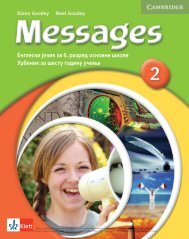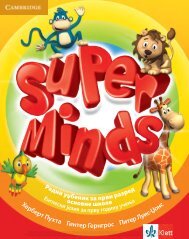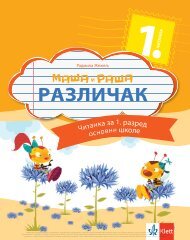Енглески језик, Way up 1 Intermediate 1, уџбеник и радна свеска за енглески језик у првом разреду гимназије, Klett
- No tags were found...
You also want an ePaper? Increase the reach of your titles
YUMPU automatically turns print PDFs into web optimized ePapers that Google loves.
3B Could I possibly …?<br />
2 A Read the article.<br />
The joy of not being ‘polite’<br />
by Anna Pande<br />
The other day, my husband and I were on our way to a party and<br />
ended <strong>up</strong> getting a bit lost. All of a sudden, my husband pulled<br />
the car <strong>up</strong> alongside a rickshaw and, without a word of greeting,<br />
shouted out the name of our destination. The rickshaw driver, unperturbed,<br />
shouted out some directions to him and we continued<br />
on our journey. I was impressed.<br />
1 A Children and teenagers often have to ask for permission to<br />
do things. Some of the expressions that are used for polite<br />
requests are given in the box. They go from 0 – blunt, rather<br />
rude to 3 – very polite.<br />
0 I want … I need …<br />
1 May I …? Can I …? Can you …?<br />
2 I’d like to (+ infinitive) May I …? Can I<br />
…? Could I …? Could you …?<br />
3 Could I … please? Could I possibly …?<br />
Would you … please? I wonder if<br />
I might …? Would you mind (+ing form)?<br />
Do you mind if I (+ Present Simple verb)?<br />
Would it be OK if I (+ Past Simple verb)?<br />
If it’s all right with you, could I …?<br />
Write requests for the following situations:<br />
1 Ask the teacher to leave early today.<br />
2 Ask your parent to wake you <strong>up</strong> a bit earlier<br />
tomorrow.<br />
3 Ask a friend if you can borrow his/her iPad.<br />
4 Ask a friend if you can read his/her diary.<br />
5 Ask your parent if a friend can stay with you<br />
overnight.<br />
6 Ask your parent if you can go to see a film<br />
with a friend.<br />
7 Ask the teacher if you can hand in your<br />
homework a day late.<br />
8 Ask a parent to watch the late night movie.<br />
B With a partner, write a dialogue between a teenager<br />
and a parent or guardian.<br />
Someone your age wants to ask a parent if s/he can go<br />
out to your friend’s birthday party on Saturday. Asking<br />
very politely gives a better chance of success. S/he also<br />
wants to come home later than usual – think of a good<br />
reason. Finally, s/he would like some money to buy a<br />
present to take to the party.<br />
C Present your dialogue as a role-play to another gro<strong>up</strong><br />
or the class.<br />
Listeners: tell the presenters what was good – or funny<br />
– in their presentations. Would you do things in a<br />
different way?<br />
While I was delighted by the enthusiasm shown by the rickshaw<br />
driver, I would advise any Indians in the UK not to try this approach.<br />
If you are lucky, you may get some directions but you are sure to<br />
ruffle some feathers. The reason is that, in the UK, we are notoriously<br />
‘polite’ (I have put ‘polite’ in inverted commas because what<br />
constitutes politeness varies from culture to culture). Any request<br />
for information has to be prefaced by an, “Excuse me, would you<br />
mind telling me …”, or “I’m sorry, I don’t s<strong>up</strong>pose you would happen<br />
to know …” OK, so these are somewhat extreme examples but they<br />
are not uncommon. A famous postcard which features a cartoon<br />
of two drowning men and the title, “How to get around in English”<br />
says it all. The first drowning man, presumably not a native English<br />
speaker, is shouting “HELP” in an attempt to attract the attention<br />
of a passer-by but to no avail. The second drowning man, on<br />
the contrary, uses the words, “Excuse me Sir, I’m terribly sorry to<br />
bother you but I wonder if you would mind helping me a moment,<br />
as long as it’s no trouble of course.” The reaction? The passer-by is<br />
only too happy to help him!<br />
Having grown <strong>up</strong> in the UK, I am accustomed to being ‘polite’, in<br />
the British sense of the word. British children, for example, are<br />
taught to use the words “Please” and “Thank you” from a very<br />
young age. “Please”, in particular, is portrayed as being a “magic<br />
word” for getting things done.<br />
Unfortunately, my attempts at politeness often backfire in India.<br />
Instead of coming across as a gesture of respect, they are interpreted<br />
as attempts to distance myself. For example, members of<br />
my (Indian) family will ask me, “Why are you saying “thank you” –<br />
we’re family?!” I have had to explain that, even with my mum and<br />
sister, I will use the words “please” and “thank you” because, well,<br />
it’s only polite.<br />
By the same token, I am often taken aback by Indian attempts<br />
to be friendly. For example, when an Indian friend of mine says<br />
to me, “Why didn’t you call me?”, I know they are just telling me<br />
that my call is important to them and, therefore, affirming that I<br />
am a friend of theirs. However, if the same words were spoken by<br />
a friend of mine from the UK, I would know that they were really<br />
annoyed with me!<br />
On the whole, I think I am getting used to, and indeed enjoying, the<br />
Indian attitude to politeness, although I do find it hard to stop myself<br />
from saying “Please” and “Thank you” several times a day. This<br />
is probably just as well because, by phasing out these words from<br />
my vocabulary, I could land <strong>up</strong> in trouble when visiting the UK!<br />
20<br />
Забрањено је репрод<strong>у</strong>ковање, <strong>у</strong>множавање, д<strong>и</strong>стр<strong>и</strong>б<strong>у</strong>ц<strong>и</strong>ја, објављ<strong>и</strong>вање, прерада <strong>и</strong> др<strong>у</strong>га <strong>у</strong>потреба овог а<strong>у</strong>торског дела <strong>и</strong>л<strong>и</strong> његов<strong>и</strong>х делова <strong>у</strong> б<strong>и</strong>ло ком об<strong>и</strong>м<strong>у</strong> <strong>и</strong> пост<strong>у</strong>пк<strong>у</strong>, <strong>у</strong>кљ<strong>у</strong>ч<strong>у</strong>ј<strong>у</strong>ћ<strong>и</strong><br />
фотокоп<strong>и</strong>рање, штампање, ч<strong>у</strong>вање <strong>у</strong> електронском обл<strong>и</strong>к<strong>у</strong>, односно ч<strong>и</strong>њење дела дост<strong>у</strong>пн<strong>и</strong>м јавност<strong>и</strong> ж<strong>и</strong>чн<strong>и</strong>м <strong>и</strong>л<strong>и</strong> беж<strong>и</strong>чн<strong>и</strong>м п<strong>у</strong>тем на нач<strong>и</strong>н кој<strong>и</strong> омог<strong>у</strong>ћ<strong>у</strong>је појед<strong>и</strong>нц<strong>у</strong> <strong>и</strong>нд<strong>и</strong>в<strong>и</strong>д<strong>у</strong>алн<strong>и</strong> пр<strong>и</strong>ст<strong>у</strong>п дел<strong>у</strong><br />
са места <strong>и</strong> <strong>у</strong> време које он одабере, без п<strong>и</strong>смене сагласност<strong>и</strong> <strong>и</strong>здавача. Свако неовлашћено кор<strong>и</strong>шћење овог а<strong>у</strong>торског дела представља кршење Закона о а<strong>у</strong>торском <strong>и</strong> сродн<strong>и</strong>м прав<strong>и</strong>ма.

















